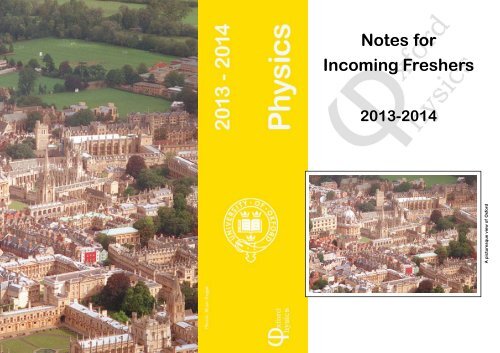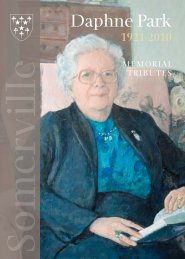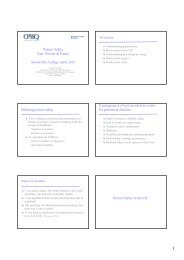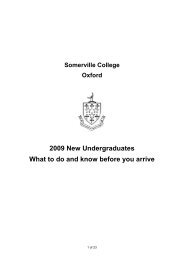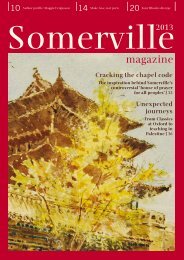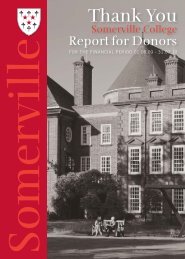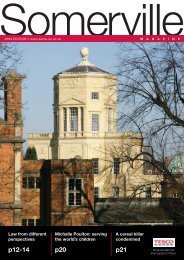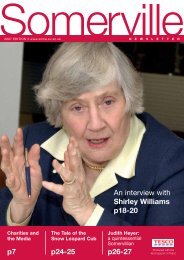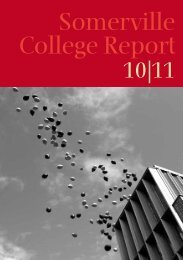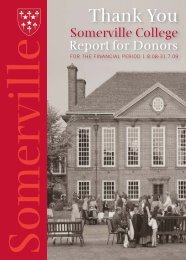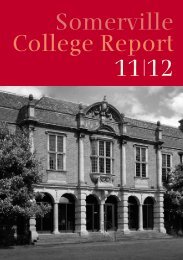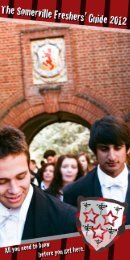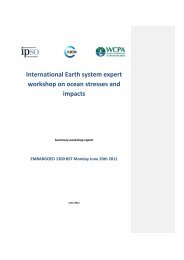Notes for Incoming Freshers - University of Oxford
Notes for Incoming Freshers - University of Oxford
Notes for Incoming Freshers - University of Oxford
- No tags were found...
You also want an ePaper? Increase the reach of your titles
YUMPU automatically turns print PDFs into web optimized ePapers that Google loves.
A picturesque view <strong>of</strong> Ox<strong>for</strong>d2007 – 2008.30Physics<strong>Notes</strong> <strong>for</strong><strong>Incoming</strong> <strong>Freshers</strong>2013-2014
These notes have been produced by the <strong>University</strong> <strong>of</strong> Ox<strong>for</strong>d Department <strong>of</strong> Physics. Other documentswhich may usefully be read alongside this one are :-1) the leaflet “Physics at Ox<strong>for</strong>d”, produced by the Physics Department and is available from thePhysics Teaching Faculty which is based in the Clarendon Laboratory. The leaflet gives in<strong>for</strong>mationabout all years <strong>of</strong> the three-year BA and the four-year MPhys courses; In<strong>for</strong>mation about the coursesis also available on the web at www.physics.ox.ac.uk2) the booklet “Ox<strong>for</strong>d Physics: The <strong>Freshers</strong>’ Guide 2013- 2014, produced by undergraduate physicsstudents.B A N B U R Y R O A DDenys Wilkinson BuildingDennis Sciama lecture theatre(via the Level 4 entrance)NClarendon Laboratory Teaching Faculty Office,Lindemann and MartinWood lecture theatresK E B L E R O A DB L A C K H A L LP A R K S R O A DPhysics Teaching Laboratories(entrance down the steps)S T G I L E S ’R DM U S E U M R Dgt Disabled Students can access the Lindemann and the Dennis Sciama Lecture Theatres by lifts from groundfloors. The Denys Wilkinson Building has toilet facilities <strong>for</strong> disabled students. Provision is made <strong>for</strong> studentsrequiring a note taker. The Martin Wood Lecture Theatre has access <strong>for</strong> disabled students, a reservedarea within the theatre and toilet facilities. There is an induction loop system <strong>for</strong> students with hearing difficulties.The Department is able to make provision <strong>for</strong> disabled students and those with other special needs. If youthink you may need any special requirements, it would be very helpful to us if you could contact the AssistantHead <strong>of</strong> Teaching (Academic) about these be<strong>for</strong>e you arrive.
PracticalsThe whole <strong>of</strong> physics depends on experimentalobservations, and learning how to make these reliablyand quantitatively is an essential part <strong>of</strong> youreducation. Practical work is there<strong>for</strong>e compulsory.It is a <strong>University</strong> requirement that you do the properamount <strong>of</strong> practical work, which averages to aboutone whole day per week <strong>for</strong> most <strong>of</strong> the first year.You keep a record <strong>of</strong> your practical work in ‘logbooks’;some <strong>of</strong> your practicals have to be writtenup in detail and are marked. A termly progressreport on your lab work is passed to your Collegetutors. Practicals are done in pairs and all arrangementswill be explained when you arrive here.VacationsOne very important point to understand is the role<strong>of</strong> “vacations” in the <strong>University</strong> year. At Ox<strong>for</strong>dthe teaching terms are very short — they add up toonly about 25 weeks in one year. Vacations haveto include holiday time; and everyone recognisesthat <strong>for</strong> many students they also have to includemoney-earning time.Nevertheless, it is absolutely essential that youset aside significant amounts <strong>of</strong> time during eachvacation <strong>for</strong> academic work. The course assumesthat you will do this. You must go over your lecturenotes, revising the material and supplementing itwith in<strong>for</strong>mation gained from tutorials and fromyour own reading. In addition to consolidatingthe previous terms work, you should also try toprepare <strong>for</strong> the next term’s courses. Your tutorswill <strong>of</strong>ten set you vacation reading and specificvacation work.SummaryThus the general pattern <strong>of</strong> the course is:• attendance at lectures and practicals, includingtaking good notes• furthering your understanding <strong>of</strong> the lecturesby self-study <strong>of</strong> the lecture material, includingreading <strong>of</strong> textbooks dealing with the sametopics, as recommended by your tutors• problem-solving and essay writing <strong>for</strong>tutorials• deepening <strong>of</strong> your understanding in the light<strong>of</strong> the tutorial work and discussion• consolidation and preparation duringvacations.The first year course in PhysicsThis is the ‘foundation’ year, on which the subsequentyears <strong>of</strong> the BA and MPhys courses bothdepend. At the end <strong>of</strong> the year you will sit thePreliminary Examination in Physics (‘Prelims’).This is the qualifying exam and must be passedbe<strong>for</strong>e you can continue your studies at Ox<strong>for</strong>d(a resit is possible in September at the discretion<strong>of</strong> your college). Prelims consists <strong>of</strong> three components:(i) four compulsory written papers, (ii)a shorter paper chosen from a range <strong>of</strong> topics and(iii) evidence <strong>of</strong> successful completion <strong>of</strong> practicalwork during the year.The four compulsory papers are:(a) CP1: Physics 1(b) CP2: Physics 2(c) CP3: Mathematical Methods 1(d) CP4: Mathematics Methods 2The Short Option topics are likely to include:(a) S01: Functions <strong>of</strong> a Complex Variable;(b) S02: Astrophysics: From Planets to theCosmos;(c) S03: Quantum Ideas.Full details are given in the Physics UndergraduateCourse Handbook (available at the start <strong>of</strong> eachyear), but synopses and reading lists <strong>for</strong> the firstterms work will be sent to you by your college.Almost all students pass Prelims and continue tostudy physics. It is possible, with the consent <strong>of</strong>your college tutors, to change to a related subject(<strong>for</strong> example Earth Sciences or Materials) at thispoint provided you have passed Prelims.Books and LibrariesThe lecturers <strong>for</strong> each <strong>of</strong> the courses issue lists <strong>of</strong>books they recommend. These will usually specifyone core text, or several alternatives, together withsome others <strong>for</strong> further study or reference. YourCollege tutors will also have suggestions, bothin general and also specifically <strong>for</strong> the subjects inwhich they are tutoring you. All the recommendedbooks (some in multiple copies) should be in yourCollege library, from which you can borrow them.If your College library doesn’t have one <strong>of</strong> therecommended books, or a book you feel you need,tell your tutor or the College Librarian. Most tutors,however, will expect you to buy a few booksyourself: these will typically be ones that youwill be using repeatedly <strong>for</strong> tutorials, perhaps <strong>for</strong>more than one year (<strong>for</strong> example “MathematicalMethods <strong>for</strong> Physics and Engineering” by Riley,Hobson and Bence).The ultimate collection <strong>of</strong> books and journals inOx<strong>for</strong>d is in the <strong>University</strong> Library, known as theBodleian Library, which includes a special sublibrary<strong>for</strong> science called the Radcliffe ScienceLibrary (RSL). The Radcliffe Science Library isthe main science and medicine research library.Learning resourcesMore details about the Radcliffe Science Libraryand lending services can be found at http://www.ouls.ox.ac.uk/rsl and http://www.ouls.ox.ac.uk/rsl/services/lending_services. Arrangements <strong>for</strong>getting access to these libraries (which requiresa “<strong>University</strong> card”) will be explained to you byyour College.ComputersAll physics students have accounts on the Physicspractical course computers, which enables them tobook practicals, as well as use the computers (wehave introductory computer courses <strong>for</strong> absolutebeginners — don’t panic!). There is a <strong>University</strong>widenetwork, which enables students to work ontheir data while back in College. Undergraduatesmay also have an account on the university computingsystem. The colleges all have computingfacilities <strong>for</strong> their undergraduates and most collegerooms have internet connections <strong>for</strong> those whobring their own machines.All new users will be asked to sign an agreementor ‘undertaking’ to abide by the <strong>University</strong> Ruleson the use <strong>of</strong> computers.Monitoring your progressBasically, there are two ways in which this is done— one by the College, the other by the <strong>University</strong>.As mentioned above, your College tutors will bemonitoring your progress week by week, in tutorials.They will also review the reports on yourlab work. At the end <strong>of</strong> each term, they will makereports on your progress. In addition, they mayset you a College (not <strong>University</strong>) exam calleda “Collection” at the start <strong>of</strong> each term, on thematerial covered in the previous term, or on thevacation reading, or both. In this way both youand your tutors can see what has been achievedand what needs more work. In some Colleges youcan be awarded a “progress prize”, and/or a prize<strong>for</strong> good work in Collections. If progress has notbeen satisfactory, your tutors will discuss with youwhat action needs to be taken.The <strong>University</strong> assesses your progress via <strong>University</strong>Examinations. These are the same <strong>for</strong> everyone,whichever College they belong to (the CollegeCollections vary from College to College). At theend <strong>of</strong> your first year you take the Prelims exam asexplained earlier. This is a pass/fail exam, not dividedinto First Class, Second Class, etc., althoughit is possible to get a Distinction. For those who failone or more papers, there are resits in September.If you fail any resit paper, you generally have toleave (this is a rule common to all <strong>University</strong> firstyear courses).2 3
Monitoring our per<strong>for</strong>manceThe Physics Department is concerned with ensuringthe high quality <strong>of</strong> all aspects <strong>of</strong> the physicscourses. One <strong>of</strong> the ways we do this is through thePhysics Joint Consultative Committee (PJCC),which consists <strong>of</strong> elected undergraduate memberswho meet twice a term to discuss, with academicstaff representatives, both academic and administrativematters concerning the physics courses. TheDepartment values the advice it receives from thisCommittee, the vitality <strong>of</strong> which is strongly dependenton student enthusiasm and involvement.Students assess their lectures and practicals eachterm using on-line lecture and practical feedback<strong>for</strong>ms. This feedback is an important source <strong>of</strong>in<strong>for</strong>mation <strong>for</strong> the Department’s own AcademicCommittee, which organises the lectures and is incharge <strong>of</strong> the Physics courses. There are also suggestionboxes in all the physics lecture theatres,where students can put comments on lectures, andin the reception area <strong>of</strong> the practical course <strong>for</strong>comments on the practical course.Student support and guidanceOn the physics side, the first subject you’ll studyis Mechanics. Our students seem to be finding thismore difficult than previously. We think that thereason <strong>for</strong> this may be that the mechanics coursequickly begins to make use <strong>of</strong> a significant amount<strong>of</strong> maths (e.g. differential equations, and complexnumbers). Although students can cope quite wellwith the maths on its own, what they seem to findhard is combining the maths with the physics. Thisinvolves, first taking a problem posed in ordinarylanguage and “setting it up” in precise mathematicalterms. Then mathematical techniques are usedto obtain a solution which has finally to be “translatedback” into physical terms. This process maynot be very familiar to you from A-Level, but it isgoing to be very important in your course at Ox<strong>for</strong>d— and it is a skill highly prized by employers!This is why we want to use the mechanics courseto introduce students, right at the start, to mathematically-basedproblem solving, and why wethink some preparatory work on solving mechanicsproblems will be useful <strong>for</strong> you.We have collected a set <strong>of</strong> problems in Mathematicsand in Mechanics, which your College Tutormay send you. If you work through these problems,you will be able to identify which topics you areshaky on, or haven’t done at all. When you get herein October, your Tutor can discuss the situationwith you, and if there are gaps to be plugged, youcan be given appropriate material to work on. YourTutor may have sent you these problems alreadyor may be going to send them — or perhaps analternative assignment. If in doubt, just write tothe Senior Physics Tutor <strong>of</strong> your College.Ox<strong>for</strong>d is quite a large <strong>University</strong> by UK standards,with over 10,000 undergraduates and more than4,000 postgraduate students. The Physics Departmentis one <strong>of</strong> the largest in the country, with about180 undergraduates entering the Ox<strong>for</strong>d Physicscourse each year. It could be easy to feel a bit lostamong such large numbers <strong>of</strong> students, but it is herethat the strength <strong>of</strong> the “College system” is mostapparent. There are 30 undergraduate Colleges, andyou are entering one <strong>of</strong> them. It will be the focus<strong>of</strong> much <strong>of</strong> your life at Ox<strong>for</strong>d. All subjects aredistributed roughly equally amongst the collegesso that you should soon get to know well the approximately6 physicists and 100 freshers in yourown college.Preparation <strong>for</strong> your first termHaving emphasised the importance <strong>of</strong> vacationstudy, we strongly recommend that you considerdoing some preparation <strong>for</strong> your first term duringthis vacation!We think there are two areas where some preparatorywork is particularly necessary: Mathematicsand Mechanics. As regards the first, you’ll findthat the physics course here is more mathematicallydemanding than your A-Level course was. Infact, approximately half the tutorial work in yourfirst year will be devoted to maths. The reason<strong>for</strong> this is that most <strong>of</strong> the physics covered in thefollowing years <strong>of</strong> the course makes essential use4Most importantly, you will be seeing your Collegetutors each week <strong>for</strong> tutorials. Their mainresponsibility is on the academic side, <strong>of</strong> course,but they are <strong>of</strong>ten the first point <strong>of</strong> contact if youhave a personal problem <strong>of</strong> any kind. A tutor maybe able to <strong>of</strong>fer help and guidance directly, or— most likely — will know whom to advise youto see. Student health and welfare are primarilyCollege responsibilities; tutors, chaplains, andother confidential advisers make up a sympatheticand effective network <strong>of</strong> support <strong>for</strong> students. Inaddition, the <strong>University</strong> has a Counselling Serviceavailable to help students, and the Student Unionhas <strong>of</strong>ficers working actively to promote studenthealth and welfare.<strong>of</strong> mathematical techniques that go well beyondeven Further Maths at A-Levels — and they areintroduced in the first year. We design the courseso that it can be successfully tackled by studentswho have not done double maths (Mathematicaand Further Mathematics) at A-level (or a comparablecourse), but single Maths people may findthe first year pretty tough. Even if you’ve donedouble Maths, you’ll begin to meet new materialquite soon in the first term, so it’s important not tothink you know it all: you can soon get left behind.We want your maths to be “up and running” whenyou get here!An Induction Session is arranged by the Department<strong>of</strong> Physics on Friday <strong>of</strong> week 0. All freshers readingphysics and, physics and philosophy are required toattend. The session consists <strong>of</strong> short presentationsintroducing the Department and covering importantaspects <strong>of</strong> the course with a tour <strong>of</strong> the practicallaboratories. Students are given their practical coursedocumentation at this session.InductionPhysics CommunityInteract, like, network… be part <strong>of</strong> the Physics community!Issued by the Physics Teaching Faculty, July 20135Your College will arrange various events during theweek be<strong>for</strong>e lectures and tutorials start. This week iscalled “week 0”, or “zeroth week”. The eight weeks<strong>of</strong> term proper are “week 1”, “week 2”, etc. Theseevents in week 0 aim to familiarise you with life atOx<strong>for</strong>d. There are also some <strong>University</strong>-based events,notably the “<strong>Freshers</strong>’ Fair” at which you will beinvited to join all kinds <strong>of</strong> clubs and societies.<strong>University</strong> <strong>of</strong> Ox<strong>for</strong>d Physics @Ox<strong>for</strong>dPhysics Ox<strong>for</strong>d Physics


